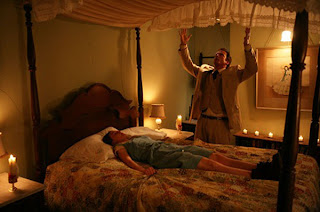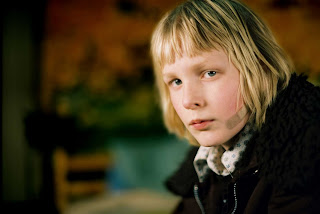I enjoy horror films. This is a somewhat bizarre taste for a clergyman I suppose (a legacy of a very secular youth) but I find them cathartic. After all, classic horror is deeply conservative – there is a peaceful status quo; there is a violent interruption to the status quo; then the violent interruption is repudiated. My taste tends more to the supernatural thriller side of things (The Exorcist, The Conjuring) rather than the gory schlock (Friday 13th) but I can enjoy most of them – particularly if I find myself in need of an emotional purging. Sometimes I can get really tense and a good ‘Aaaagh’ is effective therapy.
One of the most striking horror films of the last twenty years was the film ‘Saw’, which I thought was very interesting, and had a remarkable central conceit (ignore all the sequels and derivative copies). The premise of the first film is that an evil genius has trapped people in a room, and forces them to make painful choices if they are to survive. The Russian playwright Anton Chekhov wrote “If you say in the first chapter that there is a rifle hanging on the wall, in the second or third chapter it absolutely must go off. If it’s not going to be fired, it shouldn’t be hanging there.” Well, the film ‘Saw’ gets its name from the object lying on the floor in the opening act…
Why am I discussing such things here? Well the interesting thing about that film isn’t the gore but the exploration of the nature of choice, specifically, of the way in which we prioritise certain things rather than others. It is a measure of our humanity that we are able to step away from our own immediate needs and see a larger picture. The film is an exploration of values and it operates very effectively as a critique of the collapse of conventional western values and their replacement by mindless and selfish consumerism. Each character is faced with a particular choice, rooted in their previous patterns of life, and the challenge for each of them is to ‘choose life’.
There is a strand of theology rooted in some passages of the Old Testament which relates quite strongly to this. Specifically, in Deuteronomy chapter 30 God gives the Ancient Hebrews a choice. Either they choose life, which means to worship YHWH and establish social justice, and they shall flourish; or, they choose death, which means worshipping foreign gods and tolerating injustice, and then they shall be destroyed.
This fundamental message is repeatedly forgotten in Old Testament times, and in order to bring the people back to the right path, God sends prophets to them on a regular basis, to repeat the ‘Word of God’ and call the people back to life. Prophecy is often misunderstood as being principally about a prediction of the future. Such predictions are a part of what the prophetic ministry means, but they are a byproduct of the primary task.
Jesus himself, as the quintessential prophet, sums up the prophetic message when he describes the two great commandments. The first is to love God with all that we’ve got, to put him first in our priorities; the second is to love our neighbours as ourselves, which means to establish social justice, to ensure that no member of our society is flung onto the garbage heap. Where such priorities are not in place, the consequences are terrible. When the prophet denounces such activity he usually follows the denunciation with a vivid description of what the consequences will be, using the language of God’s wrath.
These consequences are principally geo-political. The political leadership of a country that has turned away from the right priorities is – by definition – operating in an unreal situation. This means that their decisions become less and less guided by truth, and more and more guided by the illusions held by the ruling class. The most vivid example of this in Old Testament times came with the destruction of Jerusalem by the Babylonian army in 586 BC. The ruling class had felt themselves immune to the consequences of their actions; the prophet Jeremiah denounced their foolishness (and was thrown into a cistern for his troubles); the false prophet Hananiah told the rulers that everything was going to be fine – but reality broke in and scenes from a horror movie ensued, culminating with the slaughter of the royal family on the steps of the temple.
It is a useful rule of thumb when considering the nature of God to substitute in the word ‘reality’ – instead of saying ‘God won’t like that’, say instead ‘reality won’t like that’, in other words, ‘it won’t work, it will go wrong’. To be properly attuned to God in any situation is essentially to see the underlying truth clearly, to not allow any distortions of value to mislead our judgements, to step away from illusion. This is essentially what the prophet does – he simply speaks the truth into a situation. Sometimes this truth is heard by the leadership of a community – as with Jonah in Nineveh – and the people repent, and the foretold disaster is averted. Where the truth is not heard, however, then the consequences are terrifying.
We are, I believe, in a time when the consequences of our prior actions and decisions are coming back to haunt us. Western society does not have right priorities, and it is not concerned to seek social justice, and as a consequence we are running head long into the brick wall of reality. We have built an empire upon cheap energy and easy credit, and now both of those things are being taken away. We are going to have to start making choices about what we really want – what are we prepared to let go of, what are our deepest values? Where those values are aligned with God and social justice, then we still have a potentially prosperous future ahead of us, even if it means we have to saw off things that we are remarkably attached to. If, however, we refuse to make such choices, then a bloody fate lies in wait.






